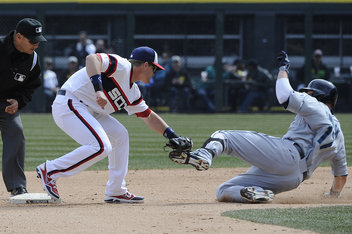The baseball season is settling into its second week. It’s early, but not too early to recognize that Major League Baseball has a problem. Competitive balance in Major League Baseball has become a joke, to the detriment to everyone who loves the game. The Houston Astros are proof of that theorem, and the Seattle Mariners can also be used to illustrate Commissioner Bud Selig’s gross negligence in managing our national pastime.
Let’s begin with the numbers, shall we? There’s one set that practically makes my argument for me. Yankees 3B Alex Rodriguez ($29 million) and 22 other players in MLB will make more this season than the Astros’ entire Opening Day roster ($18.7 million). There’s no logical or reasonable explanation for such a disparity. More importantly, that it’s allowed to happen is an indictment of Selig’s incompetence and mismanagement.
Think about those numbers for a moment. Twenty-three players will earn more than an entire team. For reasons that defy rational explanation (and insult the Astros’ fan base), Houston’s new owner has a team that would struggle in the AAA Pacific Coast League. Jim Crane says he has a plan, but as that plan develops, he’s passing off an inferior product as a major league team. Even worse, he’s charging fans major league prices to watch a team that could easily lose 130 games.
Teams like Kansas City and Minnesota can at least credibly argue that they’re “small market” teams. The Astros can’t use that crutch. The Houston metro area is home to eight million people, and Houston is the fourth largest city in the country. The Astros play in Minute Maid Park, one of the finest stadiums in baseball. They have the ability to fill Minute Maid Park, because they’ve regularly done it in years past. During the “Killer B’s” years (Craig Biggio, Lance Berkman, Jeff Bagwell), the Astros frequently played to a full house. They routinely averaged two million fans per season, all while having a payroll that in MLB terms was decidedly “middle class.” In 2005, they brought the World Series to Texas for the first time. “Small market?” Not hardly.
As for Seattle, the Mariners have become the MLB equivalent of Siberia. They wouldn’t be any less relevant if they played in Murmansk. Mariners fans may love their team, but Selig and the Lords of the Game could care less. They’ve created an economic system in which a few large markets – Boston, San Francisco, Los Angeles, and New York – collect the vast majority of high-priced talent because of their revenue base. Teams from smaller markets – Minnesota, Kansas City, Oakland, and even Seattle – are left to nibble around the margins. The role of a small market team is to function as batting practice fodder for large market teams. The Mariners exist largely to provide a West Coast market for the Yankees, Red Sox, and Angels.
Can small market teams reasonably claim to have any hope of winning a pennant? Only in the dreams of their fans, who will continue buying tickets as they hope against hope that miracles still happen. Unlike the NFL, NBA, or NHL, there’s no such thing as parity in Major League Baseball … and it’s turning the national pastime into a running joke.
Jack Cluth is on Twitter. Follow him at @yuppieskum
Add The Sports Daily to your Google News Feed!
